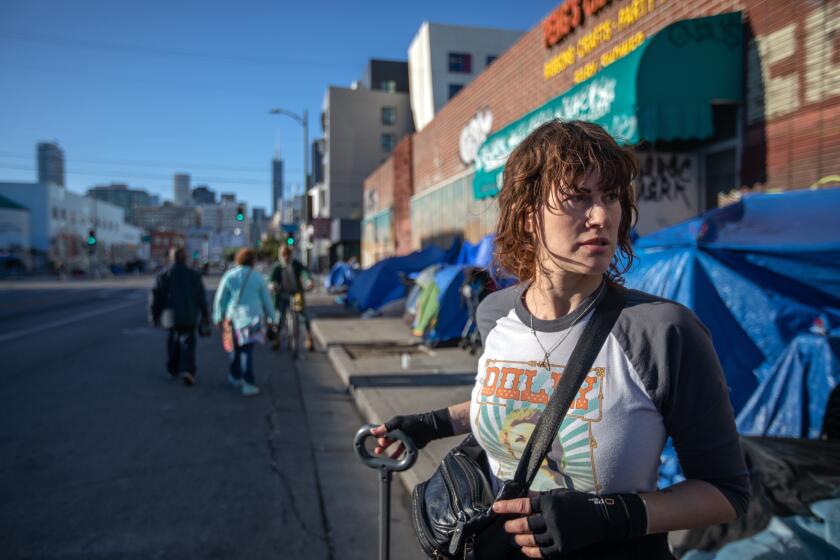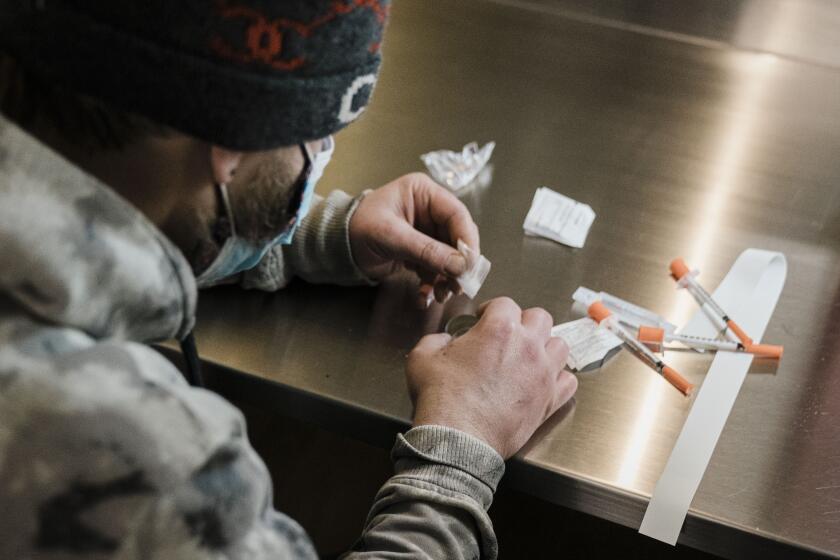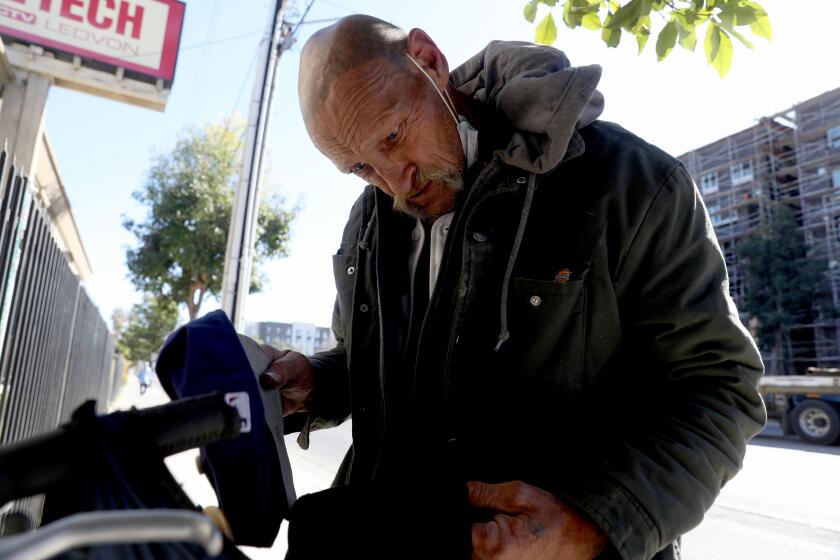California communities are banning syringe programs. Now the state is fighting back in court

- Share via
As Indiana officials struggled to contain an outbreak of HIV among people who injected drugs, then-Gov. Mike Pence reluctantly followed the urgings of public health officials and cleared the way for an overwhelmed county to hand out clean syringes.
Pence was far from enthusiastic about launching the program in Scott County, but after it rolled out in 2015, the percentage of injection drug users there who said they shared needles dropped from 74% to 22%. Within a few years, the number of new HIV infections plummeted by 96% and new cases of hepatitis C fell by 76%.
The Sierra Harm Reduction Coalition wanted to keep those same diseases in check in California. The tiny nonprofit got approval from the state to deliver syringes in El Dorado County to prevent the spread of life-threatening illnesses.
Yet when the program was discussed at a December meeting of the county’s Board of Supervisors, the success story in Indiana held little sway. Faced with complaints about discarded needles and overdose deaths, the supervisors voted to prohibit syringe programs in the county’s unincorporated areas.
“These programs may work in other parts of California and throughout the United States, although I have my doubts,” Sheriff Jeff Leikauf said at the meeting. “El Dorado County does not want or need these types of programs.”
El Dorado is among a growing number of California communities that have banned syringe programs, testing the state’s power and political will to defend them as a public health strategy. It is part of a broader pushback against “harm reduction” — the practical philosophy of trying to reduce the negative effects of drug use — as overdose deaths have soared.
Now California is fighting back. In a recently filed lawsuit, the Department of Public Health argued that local ordinances prohibiting syringe programs in El Dorado County were preempted by state law, making them unenforceable.
The California Harm Reduction Initiative, which helped dozens of syringe programs hire staff and pay for operational expenses, dries up later this year.
The state is seeking a court order telling El Dorado County and the city of Placerville, its county seat, to stop enforcing their bans and allow syringe programs to resume.
An El Dorado County spokesperson said Monday that the county does not comment on pending legal issues. Its district attorney, however, said he was outraged to learn of the lawsuit, saying that state leaders were “seeking to impose the normalization of hardcore drug use.”
“Don’t come into our county and double down on your failed policy,” El Dorado County Dist. Atty. Vern Pierson said in a statement. “Allowing addicts to use fentanyl and other hardcore drugs is exactly what has caused other California counties to experience a death rate that is out of control and getting worse.”
Mona Ebrahimi, the city attorney for Placerville, said the city had put a 45-day temporary moratorium in place “to study the ongoing effects of syringe service programs in the city.”
“The city wants to protect the health, safety and welfare of its residents,” Ebrahimi said.
The California Department of Public Health has long endorsed handing out sterile syringes as a proven way to prevent dangerous infections from running rampant when people share contaminated syringes. Researchers have linked syringe programs with a roughly 50% reduction in HIV and hepatitis C.
“It sounds crazy: ‘Wait, you want to give out the tools to people to do this thing that we all agree is a bad idea?’” said Peter Davidson, a medical sociologist at UC San Diego. But it works, said Davidson, who called the programs “probably the best studied public health intervention of the last 70 years.”
Public health officials also see them as a crucial way to reach people who use drugs and link them to addiction and overdose-prevention services. In Seattle, for instance, researchers found that injection drug users who started going to a needle exchange were five times more likely to enter drug treatment than those who never went.
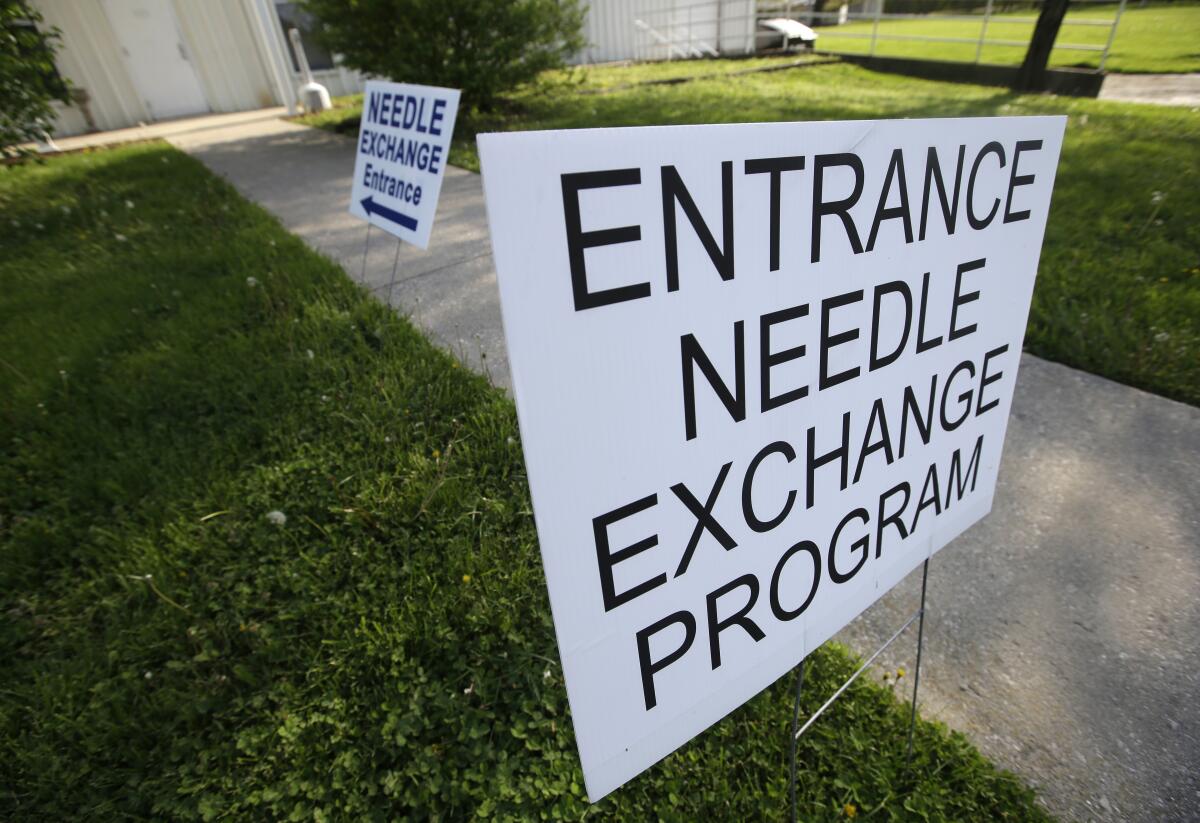
And in California, harm reduction groups have been particularly effective in getting Narcan — a nasal spray that can reverse opioid overdoses — into the hands of people who need it.
It’s “hugely important to reduce overdose in the community, and these are the programs that do that,” said Barrot Lambdin, a health policy fellow at RTI International who studies the implementation of health interventions.
Yet leaders in some cities and counties have strenuously rejected the health benefits of syringe programs.
In El Dorado County, local leaders asserted that the efforts of the Sierra Harm Reduction Coalition had not “meaningfully reduced” HIV or hepatitis C cases since its syringe program began four years ago and said the free needles were ramping up the risk of deadly overdoses, which they argued were a bigger threat.
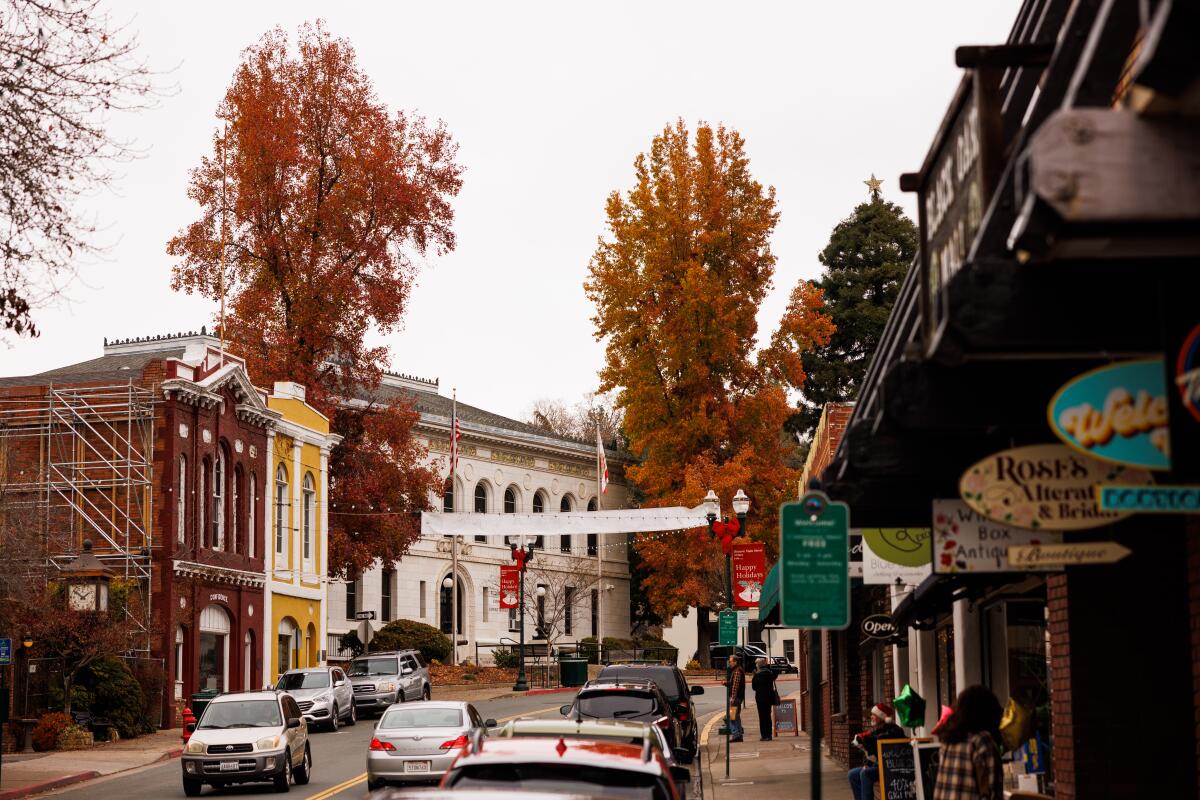
Alessandra Ross, a harm reduction expert at the California Department of Public Health, disputed such arguments in a letter to county officials. Ross pointed out that in just one year, the coalition handed out more than 2,200 doses of medication to reverse opioid overdoses, saving at least 421 lives. Without the group’s efforts, she wrote, “El Dorado County could have potentially lost more than ten times as many people to overdose.”
Under state law, the California Department of Public Health has the authority to approve syringe programs anywhere that deadly or disabling infections might spread through used needles, “notwithstanding any other law” that might say otherwise.
The agency argued that the “significant state and public interest in curtailing the spread of HIV, hepatitis, and other bloodborne infections extends to every jurisdiction in the state, especially since Californians travel freely throughout the state.”
New York is combating opioid overdoses with places where people can use drugs openly — a first in the United States.
After El Dorado County prohibited syringe services in unincorporated areas, the state public health department adjusted its authorization for the Sierra Harm Reduction Coalition program, limiting its operations to Placerville. In the court filing, the agency said it made the change out of concern for the coalition’s staff and volunteers, who could be at risk of arrest if they provided syringes in the unincorporated areas.
The nonprofit said when it stopped providing syringes outside of Placerville city limits, roughly 40% of its clients were cut off. In February, Placerville city officials passed their own urgency ordinance banning syringe programs for 45 days, exempting needle provision at health facilities.
Ebrahimi, its city attorney, said officials took that step “after CDPH concentrated their use by authorizing them only in Placerville and nowhere else in the county.”
The Sierra Harm Reduction Coalition stopped providing syringes in Placerville as well, according to the state lawsuit. The coalition did not respond Monday to requests for comment on the suit.
El Dorado County and Placerville are not alone: A wave of local bans went into effect last year in Placer County after a harm reduction group from Sacramento sought state approval to hand out clean syringes. The county’s sheriff and its probation chief said in a letter to the state that the syringe program proposed by Safer Alternatives thru Networking and Education, or SANE, would “promote the use of addicting drugs” and lead to more “dirty needles discarded recklessly in our parks.”
The Placer County Board of Supervisors voted unanimously to ban syringe programs in its unincorporated areas. Cities including Auburn, Loomis and Rocklin banned them too.
“We are the ones who should make these kinds of decisions,” then-Mayor Alice Dowdin Calvillo said at a September meeting of the Auburn City Council, “and not allow the state to just bully us.”
Public health researchers stress that studies have found that free needle programs do not increase crime or drug use, or worsen syringe litter. Yet as much of Placer County became a no-go zone, SANE withdrew its application for a syringe program there.
“Our political processes are not well set up for us to make reasoned, scientifically sound judgments about public health,” said Ricky Bluthenthal, a USC sociologist whose research has documented the effectiveness of syringe programs. It doesn’t help that “the populations at risk are often marginalized or not politically active.”
Our political processes are not well set up for us to make reasoned, scientifically sound judgments about public health.
— Ricky Bluthenthal, a USC sociologist who studies syringe programs
The California Department of Public Health declined to address whether it planned to challenge local bans on syringe programs elsewhere in the state, saying it “cannot comment on active litigation strategy.”
Syringe programs have long faced public skepticism: In a 2017 survey, only 39% of U.S. adults said they supported legalizing them in their communities.
Experts say the programs have faced increasing jeopardy as public concern wanes about the threat of HIV and frustration swells over other problems like soaring numbers of overdose deaths and the spread of homeless encampments. Even in Indiana’s Scott County, local leaders voted three years ago to shutter its needle exchange.
Clashes are also arising because programs are making moves into new parts of California, bolstered in some cases by state funding. California officials also have taken steps to help syringe programs overcome local opposition, including exempting them from review under the California Environmental Quality Act.
“It’s not surprising that cities and counties are motivated to protect the public health and safety of their residents through whatever tools they have at their disposal,” said attorney David J. Terrazas, who represented a group that successfully sued to overturn state approval of a syringe program in Santa Cruz County.
By administering long-acting antipsychotic medication, Dr. Susan Partovi is pushing boundaries in her efforts to help people who are homeless and struggling with mental illness.
In that case, a state appeals court ruled last year that the California Department of Public Health conducted an insufficient review of a program run by the Harm Reduction Coalition of Santa Cruz County. The department didn’t do enough to consult with law enforcement agencies in the area, among other shortcomings, the court said.
Although the state health department had considered some comments from law enforcement, “it never engaged with them directly about their concerns,” the appeals court concluded. Internal records showed department staff had decided not to respond to some of their comments and called one police chief an “imbecile.”
Terrazas said local officials are best poised to know what works for their communities. But Denise Elerick, founder of the Harm Reduction Coalition of Santa Cruz County, argued it made no sense for law enforcement to hold sway in public health decisions.
“We wouldn’t consult with them on what to do about COVID,” Elerick said.
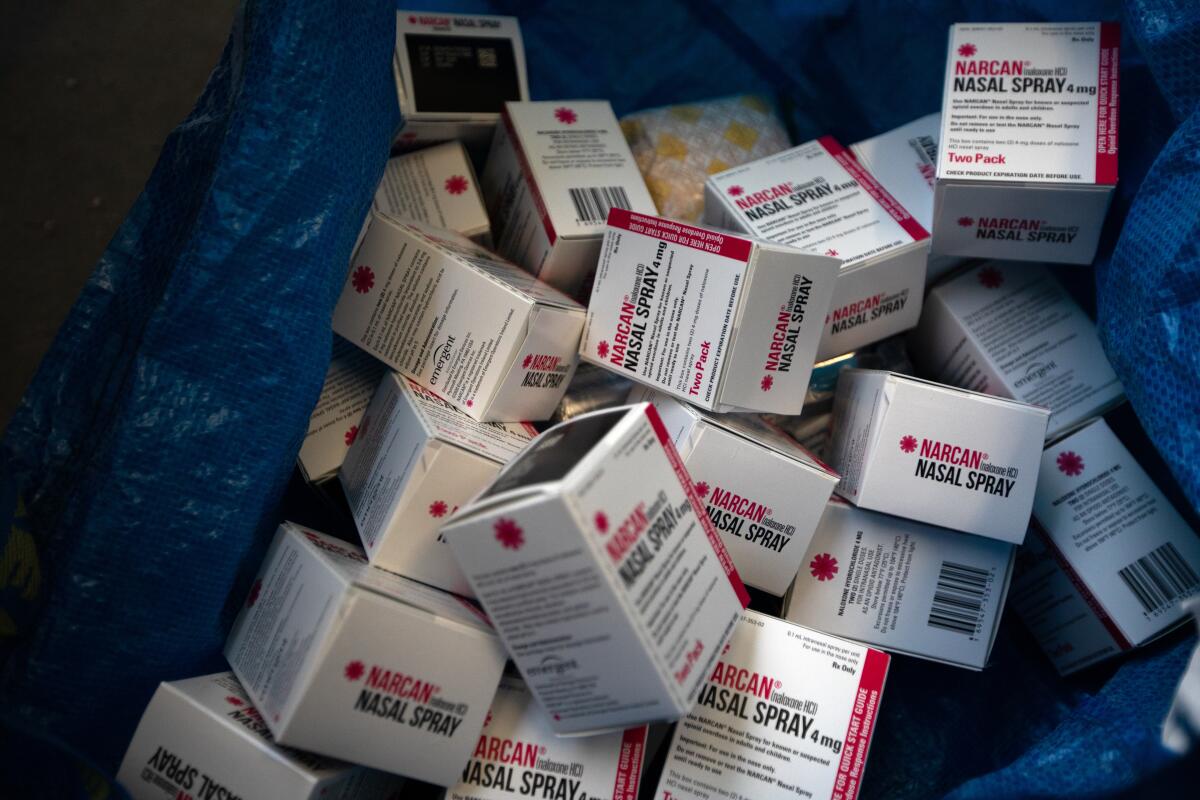
Weeks after the court ruling, the state health department rolled back its approval for a syringe program in Orange County that would have been run by the Santa Ana-based Harm Reduction Institute, saying it wanted to consult more with local officials.
The decision was celebrated by city leaders in Santa Ana, who had banned syringe programs in 2020 and sharply opposed efforts to restart one. At a recent meeting, interim city manager Tom Hatch said a previous program was “an epic failure” that left its downtown littered with used syringes.
Orange County is now the biggest county in the country without a program providing clean syringes, according to the California Department of Public Health.
Orange County is currently the most populous county in the state without any syringe services programs — to the alarm of health researchers who found that syringe reuse increased after a local program was shut down.
The Santa Cruz court ruling was also invoked by the Santa Monica City Council, which directed city officials to investigate how Los Angeles County came to approve a program run by the Venice Family Clinic. That program sends outreach workers into Santa Monica parks once a week to offer clean syringes, Narcan and other supplies and connect people with healthcare, including for addiction.
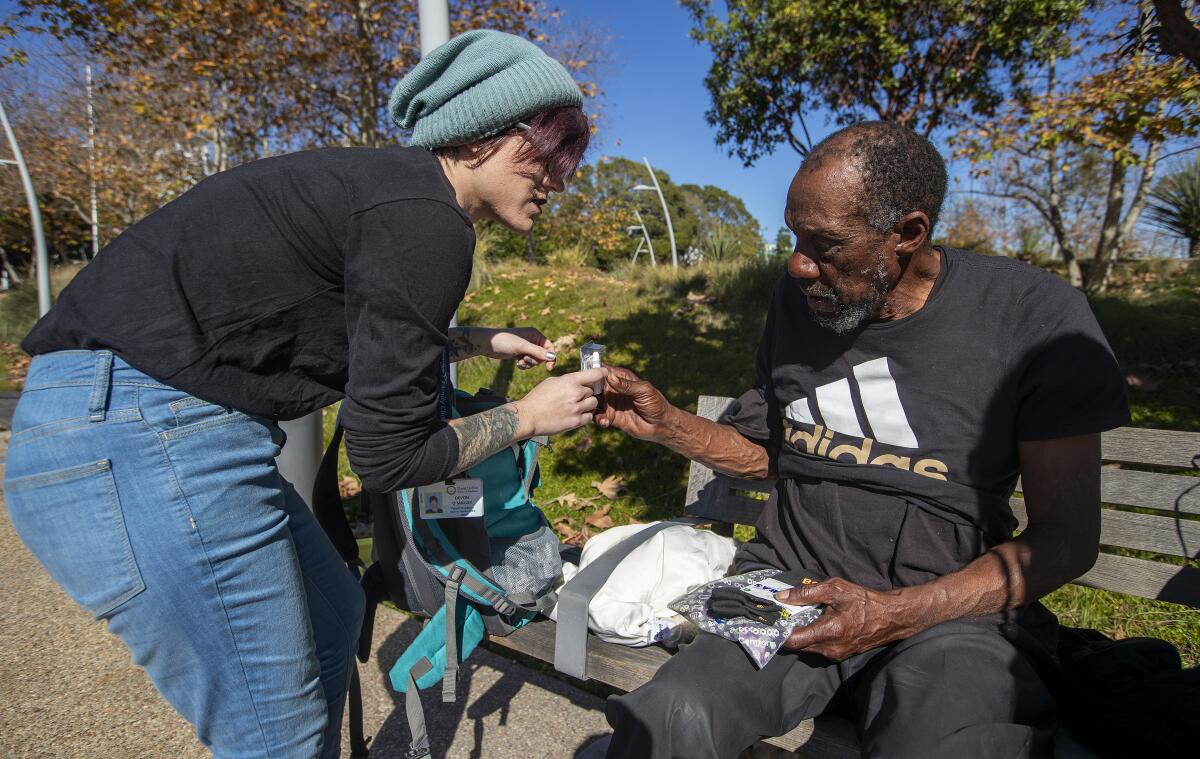
Critics want the program to relocate indoors, which they say would better protect parkgoers from discarded syringes. In addition, “if someone has to walk inside, there’s a chance for counselors to suggest strongly that it’s time for them to get off the drugs,” said Santa Monica Mayor Phil Brock, who wants the city to formally express its opposition to the program. “We can’t just facilitate their demise.”
Last month, a group called the Santa Monica Coalition filed suit to get L.A. County to halt the program it approved, saying it should instead be in a government building.
But Venice Family Clinic staffers said unhoused people can be reluctant to leave behind their belongings to go elsewhere. Even offering services out of a van reduced participation, said Arron Barba, director of the clinic’s Common Ground program.
“Bringing the service directly to the people is what we know works,” Barba said.
More to Read
Sign up for Essential California
The most important California stories and recommendations in your inbox every morning.
You may occasionally receive promotional content from the Los Angeles Times.
